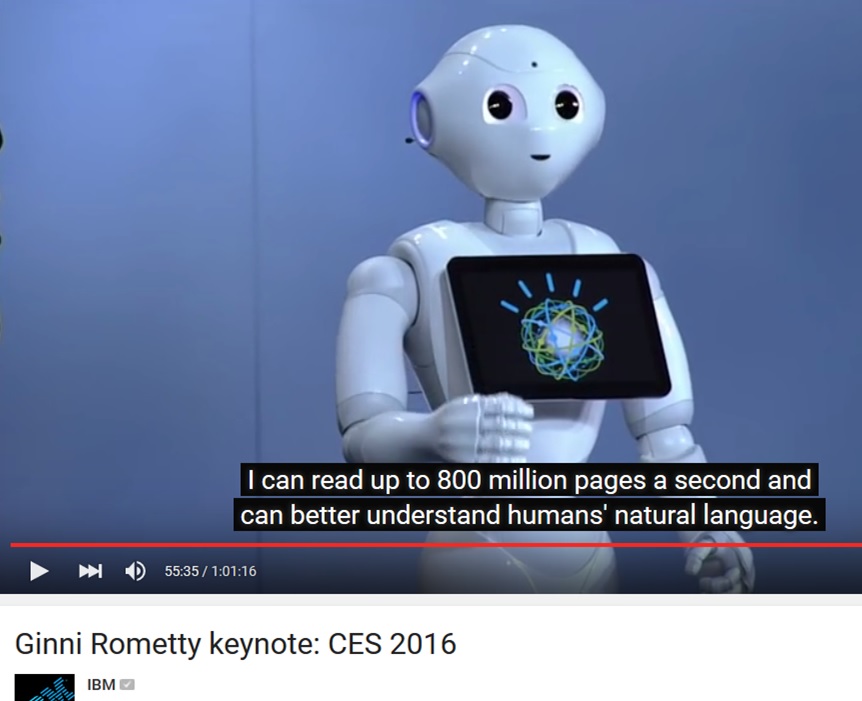
The IBM CEO, Ginni Rometty, gives a keynote at the CES2016, one of the biggest consumer tech shows that was held in Las Vegas in early January. In partnerships with Under Armour, Medtronic, and SoftBank, Rometty talks cognitive technology, the Internet of Things (IoT), and how Watson is changing everything.
2016
A massive ad campaign is mounted as of early 2016 (perhaps earlier), promoting COGNITIVE COMPUTING, for one, as a new term “unveiled” to tech consumers. Celebrities are filmed with Watson including Bob Dylan, Serena Williams and Frank Abagnale, a former fraudster, now “white hat” conman. The ads are witty and clever, and infer some superb properties of each person filmed (language skills, high performance, and astuteness). Simple folk profile the system’s approach-ability (a little girl and yes, a dog and the pet-owner) and its helpfulness (for a teacher). All around “a cognitive superhero” that the IBM didn’t spare resources on carefully selecting a package of angles for promotion! Let’s see how it lives up to the set expectations.
What is Watson?
Here is some background reading on Watson, in case you are interested in tracing back the story of Watson.
2015
Watson’s Question-and-Answering Technology makes it into the educational toy consumer market. It’s worth seeing how kids interact with the “smart” toy (~ 5 min video): https://d2pq0u4uni88oo.cloudfront.net/projects/1616391/video-498289-h264_high.mp4
The associated article announcing the release of the toy and claiming educational uses of the IBM’s Watson with an ability “to talk and learn like a friend”: http://on.recode.net/1zlpS8O
[Disclaimer: I’m not promoting or supporting this venture, I’m simply noting its appearance and encouraging you to learn the uses and limitations of this language technology. It has a potential to act like reference services, with a Q&A session based on its IR-like functions plus speech recognition and text-to-speech. Next thing you know toys like this will be sitting in many library’s children’s sections as novelties.]
2014
IBM’s Watson, the natural language supercomputer, can now construct arguments (pros and cons) on controversial topics such as violent video games. I’d recommend you see a short snippet of the video (at around 45:25 till 49:45 for a demo). The whole video is on cutting edge computing and its future. One of the speakers refers to Watson’s debating abilities as “shockingly impressive”, the moderator suggests a peculiar US government-related application (hmm!!!). Another quote that sums it up is:
“It’s no longer the game of men vs. machines, it’s men and machines reasoning together”. The current applications are huge in health informatics (supporting medical diagnostics) and rapidly moving into other areas.
Well, how is this “big data + natural language processing + super-computing” going to impact library and information science? Or more specifically library reference services? Or, the way we search and use information, for that matter? Any thoughts? The closing quote in the video is:
You think these things are going to take a long time, but then they are right on top of you…
2011
A 30-second teaser from PBS NOVA that sets up the problem:
Interview with the AI scientists that answer:
Watson is “more astonishing than … Deep Blue” that “challenged the world’s top chess player in 1997”
http://www.pbs.org/wgbh/nova/tech/will-watson-win-jeopardy.html
The Wikipedia page with videos at the end:
http://en.wikipedia.org/wiki/Watson_(artificial_intelligence_software)
If you’ve seen other significant capacities or functions (perhaps in legal or health domains), please feel free to point it out. Just leave a link and a comment! Thank you!
